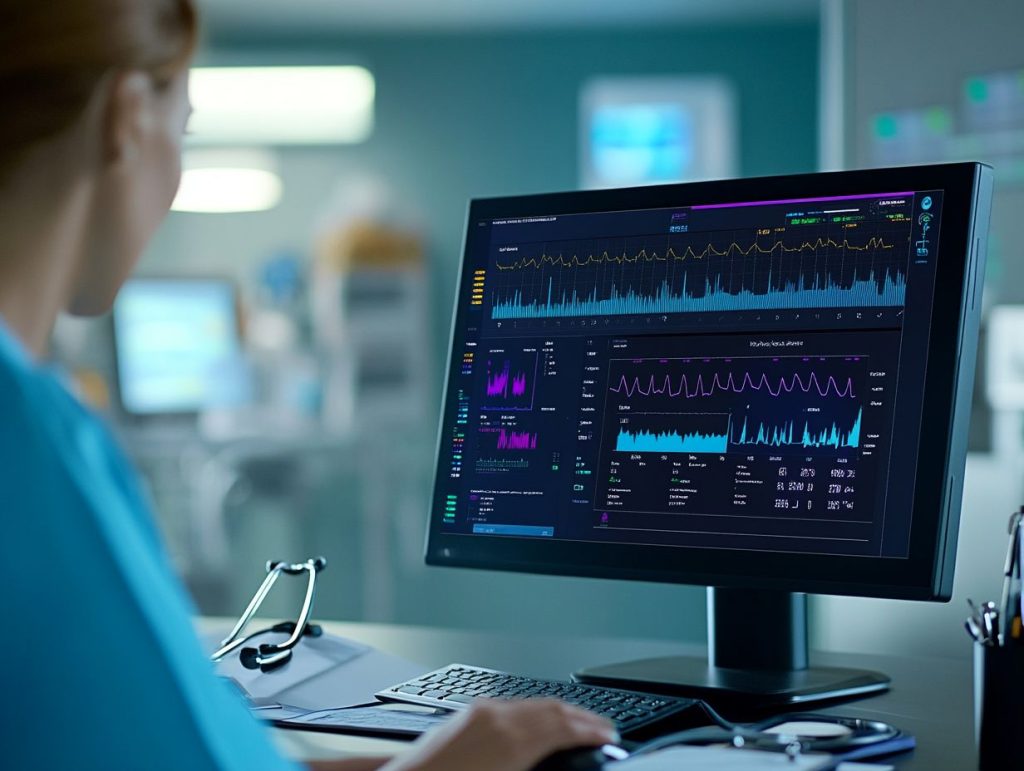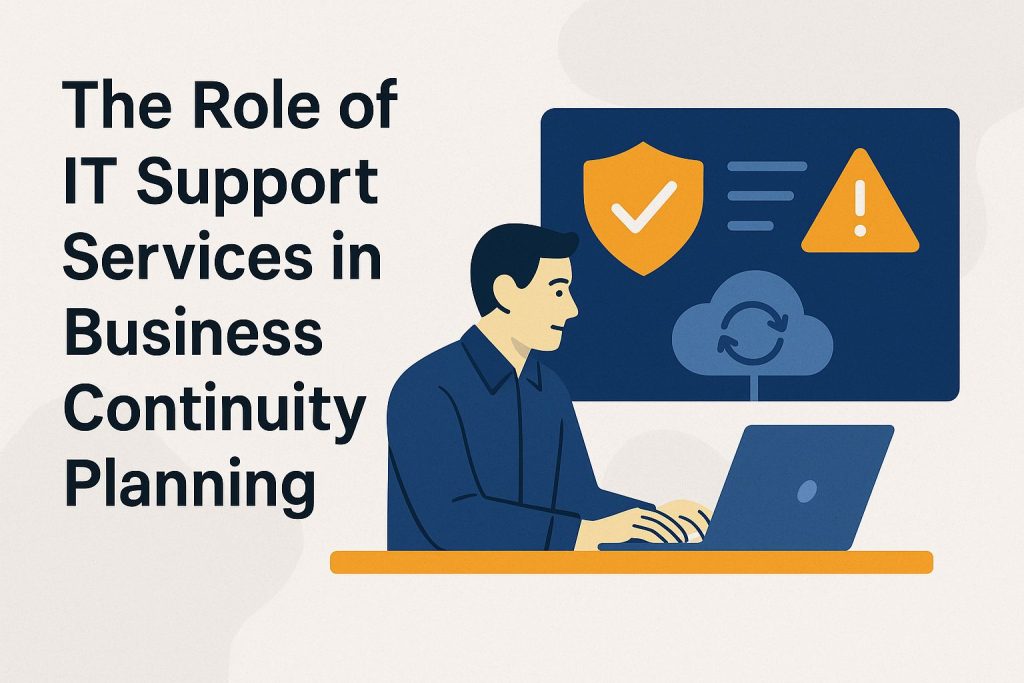The Role of Managed IT in Supporting Columbia’s Healthcare Providers

In today’s fast-paced healthcare, managed IT services are vital for healthcare providers. They enhance patient care and streamline operations. This article examines the main functions of managed IT in healthcare. It focuses on security, IT governance, compliance, and integration with existing systems. It emphasizes the specific services offered to Columbia’s healthcare providers and showcases real-life success stories that highlight the transformative impact of effective IT management.
The discussion highlights how managed IT can revolutionize healthcare delivery.
The Importance of Managed IT in Healthcare
Managed IT is essential in healthcare. It enhances efficiency and ensures quality patient care. As providers pursue digital transformation, effective IT solutions are imperative.
Managed IT services integrate advanced technologies. They streamline workflows and improve healthcare communication. This leads to better patient outcomes and enhanced information systems.
Healthcare organizations can focus on delivering high-quality patient care. They can depend on managed IT for data management, cybersecurity, and regulatory compliance.
Overview of Managed IT Services
Managed IT services comprise a comprehensive array of IT support solutions specifically designed for the healthcare industry, with a focus on enhancing operational efficiency and ensuring compliance with healthcare regulations, including IT strategy development and vendor management.
These services include:
- Technical support, where IT professionals are readily available to address issues in a timely manner.
- Infrastructure management, which ensures that hardware and software systems are optimized for optimal performance and supports seamless system upgrades.
Cloud computing solutions let healthcare organizations store and access data securely. They also facilitate collaboration among staff. Those interested in understanding the broader benefits of cloud computing might appreciate our insights on Cloud Computing for Columbia Businesses, which delve into how these solutions can transform operational efficiency. Additionally, IT outsourcing has become increasingly vital, allowing healthcare providers to allocate resources more effectively and optimize IT budgeting for improved healthcare analytics.
Crucially, service level agreements establish clear performance metrics, ensuring that the IT support provided aligns with the organization’s specific needs, ultimately improving patient care and operational outcomes.
Benefits for Healthcare Providers

Healthcare providers benefit from managed IT services. These services enhance operational efficiency and improve patient care outcomes in today’s digital landscape, supported by strategic planning and health IT standards.
By adopting these services, organizations can significantly enhance their IT compliance, ensuring adherence to regulatory requirements while effectively safeguarding patient data.
For example, streamlined data management can reduce errors in patient information, facilitating quicker access to critical health records when necessary.
The integration of telemedicine services through managed IT further enhances accessibility, allowing patients to consult with healthcare professionals from the convenience of their homes.
Such advancements not only drive healthcare innovation but also promote better patient engagement, enabling individuals to monitor their health effectively and interact with providers, ultimately encouraging a more proactive approach to health management.
Challenges in Healthcare IT
Despite advancements in healthcare IT, many challenges still hinder its full potential.
Key issues include cybersecurity threats, regulatory compliance, and interoperability challenges. These require strong health information exchange frameworks. For businesses seeking solutions to these challenges, strategic IT consulting can be crucial. You can learn more about how strategic IT consulting can facilitate growth and address these issues.
Security and Compliance Concerns

Security and compliance are critical in healthcare IT. Regulations like HIPAA dictate how to protect and manage patient data privacy.
Health information is sensitive. A breach can hurt patient trust. It can also lead to legal penalties and large financial losses. Cyber threats are evolving. Healthcare facilities must adopt IT risk management strategies. These strategies should address technology and human behavior.
Creating a culture of security is essential. Ongoing staff training is key. Employees need to recognize phishing attempts. They must understand their role in protecting data. By prioritizing these measures, healthcare organizations can establish a proactive stance against potential threats, thereby ensuring the integrity and confidentiality of patient information.
Integration with Existing Systems
Integrating managed IT solutions with healthcare systems is challenging. It involves interoperability and the smooth flow of patient information. This requires advanced technical skills.
The complexity often arises from legacy systems that were not designed with modern integration needs in mind, resulting in data silos that can impede timely access to critical information. A robust technical infrastructure, including secure networks and standardized protocols, is essential to ensure effective communication among disparate systems.
Addressing these challenges is crucial. Successful integration streamlines healthcare operations. It also improves technology frameworks. This leads to better patient information systems and fosters innovation.
Ultimately, this supports better decision-making, fosters collaboration among healthcare providers, and delivers more coordinated, high-quality care to patients.
How Managed IT Supports Columbia’s Healthcare Providers
Managed IT services support healthcare providers in Columbia by delivering customized IT solutions that enhance operational efficiency and ensure high-quality patient care. For a deeper look into how these services can be tailored to meet the unique needs of healthcare organizations, explore our managed IT support options for Columbia healthcare providers.
Specific Services and Solutions Offered
Columbia’s managed IT services offer tailored solutions for healthcare providers. These include cloud infrastructure, disaster recovery, analytics, and support for electronic medical records.
These services streamline operations and enhance patient care. Cloud infrastructure ensures secure storage and easy access to healthcare data. This facilitates collaboration among medical teams.
Disaster recovery solutions protect critical information, allowing healthcare organizations to quickly recover from unexpected outages or data losses, thereby maintaining continuity of care and ensuring business continuity.
Furthermore, advanced healthcare analytics deliver actionable insights that support well-considered choices and improve patient outcomes. Managed services play a pivotal role in this environment, as they not only enhance system reliability but also provide effective technical support.
This allows healthcare providers to concentrate on their primary mission of patient care without being burdened by IT challenges, facilitating better care coordination.
Real-life Examples and Success Stories

Real-life examples of successful managed IT implementations show the impact on healthcare providers. They emphasize improvements in patient care and operational efficiency through technology adoption.
One notable instance involves a regional hospital that adopted an integrated electronic health record (EHR) system. This implementation not only streamlined the documentation process but also enhanced clinical decision support tools.
By utilizing advanced analytics, healthcare professionals were able to interpret patient data more effectively, resulting in a 30% reduction in medication errors and a significant increase in adherence to treatment protocols. Consequently, this hospital experienced a remarkable improvement in patient satisfaction scores, illustrating the direct correlation between technology adoption and enhanced quality of care.
Additionally, studies indicate that healthcare organizations leveraging managed IT solutions can experience up to a 25% increase in operational efficiency, allowing them to allocate more resources toward direct patient care.
Frequently Asked Questions
What is the role of managed IT in supporting Columbia’s healthcare providers?
Managed IT supports Columbia’s healthcare providers by offering technology solutions. These solutions improve efficiency, streamline processes, and enhance patient care.
How does managed IT help healthcare providers in Columbia?
Managed IT provides 24/7 monitoring and support. It ensures reliable and secure technology systems. It also helps implement and optimize electronic health record systems.
What types of services are included in managed IT support for healthcare providers in Columbia?
Managed IT support includes network and server management, cybersecurity solutions, help desk support, and cloud computing services.
Why is managed IT support with advanced healthcare IT infrastructure important for healthcare providers in Columbia?
Managed IT support helps healthcare providers in Columbia stay competitive. It improves efficiency and enhances patient care.
How can managed IT support and telehealth solutions benefit smaller healthcare providers in Columbia?
Managed IT support benefits smaller healthcare providers in Columbia. It provides access to advanced technology solutions, including cloud services and mobile health applications. It offers expertise that may not be feasible to maintain in-house.
What are the potential risks and challenges, such as IT compliance and network security, of not having managed IT support for healthcare providers in Columbia?
Without managed IT support, healthcare providers in Columbia face risks. These include data breaches, system downtime, IT governance issues, and compliance challenges regarding health IT standards.




